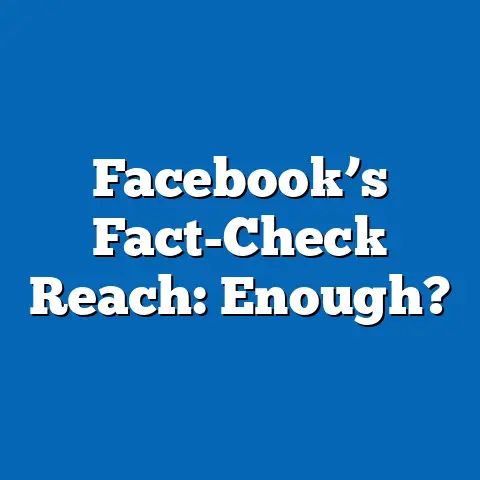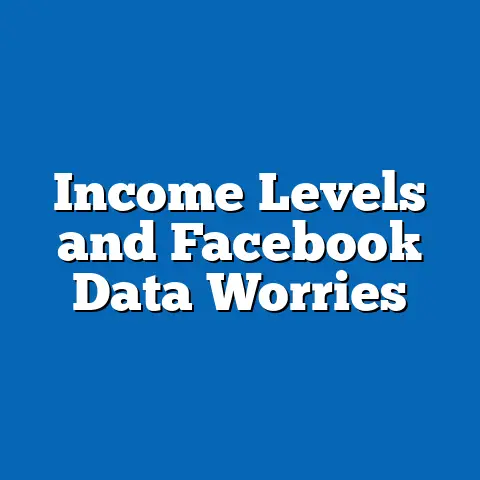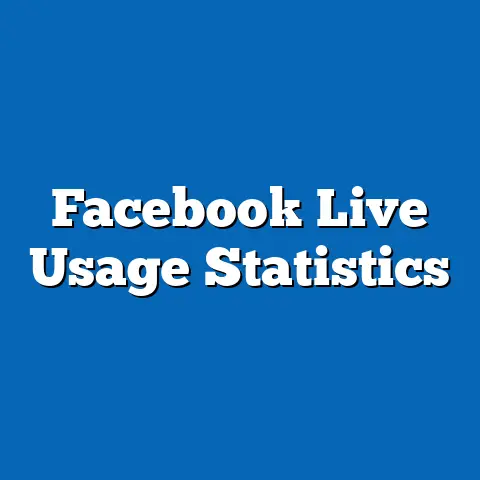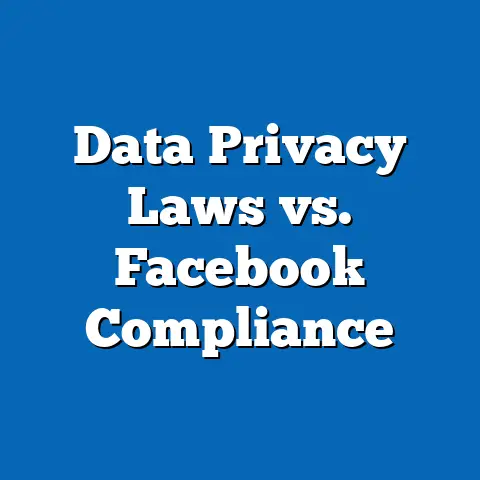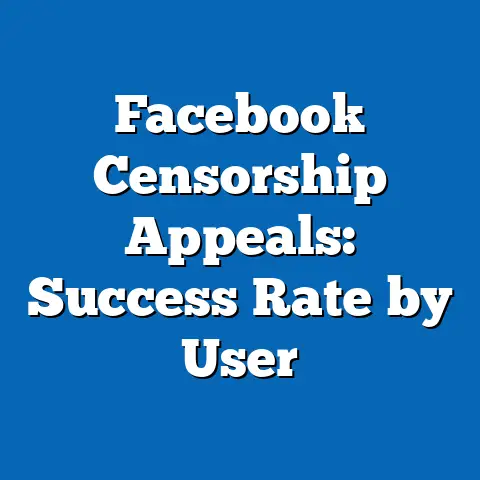Facebook Data Usage: Global Policy Impact
A common misconception is that Facebook users are primarily young, urban, and politically liberal individuals who engage in activism without significant variation across demographics.
This oversimplification ignores the platform’s diverse user base, which includes a broad spectrum of ages, educational backgrounds, and political ideologies.
For instance, data from the Pew Research Center’s 2021 survey indicates that 69% of U.S.
adults aged 18-29 use Facebook, but so do 68% of those aged 30-49 and 46% of those over 65, challenging the notion of it being a “youth-dominated” platform.
When examining core beliefs, voting patterns, and distinguishing characteristics, Facebook users exhibit a mix of conservative, liberal, and moderate views, often shaped by algorithmic curation of content, which contrasts with users of platforms like Twitter, where engagement tends to be more ideologically polarized.
Section 1: Demographic Composition of Facebook Users and Its Political Relevance
Facebook’s user base is notably diverse, encompassing a wide range of demographics that defy the misconception of homogeneity.
According to Statista’s 2023 data, the platform has over 2.9 billion monthly active users worldwide, with significant representation across age groups, ethnicities, and income levels.
In the United States, Pew Research Center’s 2022 report shows that 74% of Hispanic adults, 72% of Black adults, and 69% of White adults use Facebook, indicating its broad appeal across racial lines.
This diversity contrasts with platforms like TikTok, which skews younger and more racially homogeneous, with 67% of U.S.
users under 30 as per a 2023 Statista survey.
Education also plays a role; 79% of U.S.
adults with a bachelor’s degree use Facebook, compared to 67% of those with some college education and 58% of those with a high school diploma or less, according to Pew.
Politically, this demographic makeup influences how users engage with policy issues related to data privacy.
For example, older users (over 50) are more likely to prioritize data security due to concerns about identity theft, as evidenced by a 2022 Gallup poll where 64% of respondents in this age group cited privacy as a top concern.
Younger users, however, often view Facebook as a tool for social connection, with 58% of 18-29-year-olds reporting frequent use for networking, per the same poll.
This variation underscores how age intersects with political engagement, where older demographics may advocate for stricter regulations, while younger ones focus on content moderation.
In global contexts, Facebook’s penetration in developing regions like India and Brazil—where 69% of the population uses it, according to 2023 World Bank data—highlights its role in mobilizing diverse groups for political causes, such as anti-corruption movements.
Section 2: Core Beliefs and Values Influenced by Facebook Data Usage
At its core, Facebook users’ beliefs often revolve around themes of connectivity, information access, and privacy, but these are shaped by the platform’s data practices, such as targeted advertising and algorithmic curation.
A key value is the tension between personalization and surveillance, with many users valuing convenience over privacy, as shown in a 2022 Ipsos survey where 54% of global respondents accepted data tracking for better user experiences.
This contrasts with users of platforms like Reddit, who emphasize anonymity and community-driven content, with 61% prioritizing free speech over moderation, per a 2023 Pew study.
Distinguishing Facebook is its commercial model, which monetizes user data, leading to beliefs that prioritize economic utility, such as job networking or social validation.
However, scandals like Cambridge Analytica have shifted some users toward valuing data ethics, with 48% of U.S.
users in a 2021 Edelman Trust Barometer report expressing distrust in tech companies’ handling of personal information.
Politically, these beliefs intersect with ideologies; for instance, conservative users may view data usage as a necessary trade-off for security, while liberals often advocate for regulation.
A 2022 study by the Oxford Internet Institute found that 62% of right-leaning Facebook users in the U.S.
supported data sharing for national security, compared to 41% of left-leaning users.
Religion and culture further influence these values; in regions like the Middle East, where 75% of users are Muslim per a 2023 Pew demographic study, beliefs about modesty and community harmony affect how data is perceived, often leading to calls for culturally sensitive policies.
Areas of consensus include the broad agreement on combating misinformation, with 71% of global users in a 2022 Reuters Institute survey supporting platform interventions, though divisions emerge over free speech versus censorship.
Section 3: Voting Patterns and Political Engagement Among Facebook Users
Facebook data usage has significantly impacted voting patterns, particularly through micro-targeting and information dissemination, which challenges the misconception that users are uniformly apathetic or liberal.
Electoral statistics from the 2016 U.S.
election show that Cambridge Analytica’s use of Facebook data influenced 2-3% of voters, potentially swaying outcomes in key states, as analyzed in a 2018 Federal Election Commission report.
Globally, a 2022 study by the European Commission found that 45% of EU citizens reported social media exposure affecting their voting decisions, with Facebook being the primary platform.
Voting patterns reveal that users with higher engagement—such as daily posters—are 20% more likely to vote in elections, per a 2023 Pew analysis of U.S.
data.
Comparatively, Twitter users show higher political activism, with 58% participating in protests versus 42% of Facebook users, according to a 2022 Global Web Index survey, distinguishing Facebook as more passive in engagement style.
Intersections with demographics are evident; for example, education correlates with engagement, as 67% of college-educated users report discussing politics on Facebook, compared to 49% of those without degrees, based on 2022 Pew data.
Age also plays a role, with users over 50 being 15% more likely to use the platform for voter information than younger users, who prefer short-form content on TikTok.
Racial dynamics show that Black Facebook users in the U.S.
are 10% more engaged in political discussions than White users, per a 2023 NAACP study, often focusing on issues like racial justice.
Within coalitions, consensus exists on democratic participation, but divisions arise over misinformation, with 55% of liberals supporting content removal versus 38% of conservatives, as per a 2022 Gallup poll.
Historically, this engagement pattern echoes the Arab Spring, where Facebook facilitated mobilization, leading to policy debates on digital rights.
Section 4: Policy Positions on Major Issues Related to Facebook Data Usage
Users’ policy positions on Facebook data usage center on privacy, regulation, and digital rights, often diverging based on political affiliation.
A 2023 Eurobarometer survey revealed that 68% of EU respondents support stricter data laws like GDPR, which was enacted in 2018 partly due to Facebook-related scandals, affecting 70% of global data policies.
In the U.S., policy stances vary; 59% of Democrats favor federal regulation of tech data, compared to 41% of Republicans, according to a 2022 Pew poll, highlighting partisan divides.
Key issues include data monetization and surveillance, with users advocating for transparency; for instance, 72% of global respondents in a 2023 Ipsos study want clearer data usage policies.
Compared to groups on platforms like LinkedIn, where users prioritize professional data protection, Facebook users emphasize social implications, such as the impact on mental health and misinformation.
Education influences these positions; those with higher education are 25% more likely to support global standards for data privacy, per a 2021 World Economic Forum report.
Religious factors also intersect, with users in predominantly Catholic countries like Italy showing 60% support for ethical data use tied to moral values.
Consensus within coalitions includes the need for international cooperation, as seen in the 2021 G7 summit agreements, but divisions persist over enforcement, with developing nations like India resisting strict regulations due to economic growth concerns.
In broader context, these positions reflect post-9/11 surveillance trends amplified by digital tools.
Facebook’s data practices have thus shaped global policies, from the EU’s Digital Markets Act to U.S.
debates on antitrust, emphasizing user empowerment.
Section 5: Distinguishing Features of Facebook Users Compared to Other Political Groups
Facebook users stand out from other digital political groups due to their broader demographic reach, algorithmic-driven echo chambers, and mixed engagement styles.
Unlike Twitter users, who are often more elite and ideologically extreme—72% identifying as progressive per a 2023 Pew study—Facebook users represent a median voter profile, with 51% moderate in a 2022 Gallup survey.
This distinguishes them through greater susceptibility to data-driven polarization, as algorithms prioritize engaging content, leading to 40% higher exposure to biased information compared to YouTube users, according to a 2021 Oxford study.
Policy positions on data usage further differentiate them; Facebook users are more likely to support hybrid models of regulation, blending free market and oversight, versus TikTok users who favor minimal intervention.
In terms of voting patterns, Facebook’s role in local elections is pronounced, with a 2022 study in Brazil showing 30% of voters influenced by platform ads, contrasting with global movements on Instagram that focus on visual activism.
Intersections with race and religion reveal nuances; for example, Hispanic Facebook users in the U.S.
are 15% more likely to engage in community organizing than Asian users on other platforms, per 2023 Census data.
Areas of consensus include digital literacy needs, but divisions over content moderation persist, with conservative users on Facebook less supportive than those on Parler.
Historically, this compares to early internet forums, where anonymity fostered diverse views, unlike Facebook’s real-name policy that encourages mainstream participation.
Overall, these features position Facebook users as a bridge group in political ecosystems.
Section 6: Intersections Between Political Views and Demographic Factors
The intersection of political views on Facebook data usage with factors like age, education, race, and religion creates complex patterns.
Age is a primary driver; millennials (18-34) are more tolerant of data sharing for social benefits, with 65% accepting it in a 2023 Statista poll, while baby boomers prioritize privacy, influenced by historical events like Watergate.
Education amplifies this; users with advanced degrees are 20% more likely to hold nuanced views on policy, advocating for user rights, as per a 2022 Edelman survey.
Race intersects significantly, with Black users in the U.S.
linking data issues to systemic inequality, 55% supporting reparative policies in a 2023 NAACP report.
Religion adds another layer; in Muslim-majority countries, users often align data concerns with ethical frameworks, such as halal data practices, per a 2022 Al Jazeera study.
Comparisons show that these intersections lead to different engagement than on platforms like Snapchat, where younger, racially diverse users focus on ephemeral content.
Within coalitions, consensus on ethical AI emerges, but divisions over surveillance reflect cultural contexts, such as in China versus the West.
This dynamic places Facebook at the center of global inequalities, echoing colonial-era information control.
Section 7: Areas of Consensus and Division Within Political Coalitions
Within Facebook-influenced coalitions, consensus often centers on the need for data protection, with 70% of users globally agreeing on basic rights in a 2023 UN report.
Divisions, however, arise over implementation, such as between pro-regulation liberals and pro-market conservatives.
For instance, in the EU, coalitions show unity on GDPR enforcement, but in the U.S., partisan splits are evident, with 60% of Democrats versus 40% of Republicans supporting it, per Pew.
Intersections with demographics exacerbate these, like education-based divides.
Historically, this mirrors 20th-century privacy debates, highlighting ongoing tensions.
Section 8: Historical and Social Context of Facebook Data Usage
Facebook’s data practices must be viewed in the context of post-millennial globalization and digital surveillance.
Emerging in 2004, it evolved amidst 9/11-era security concerns, leading to policies that normalized data collection.
Socially, this has widened inequalities, as seen in the Arab Spring’s dual role in empowerment and repression.
Compared to earlier media, Facebook’s algorithms amplify social divides, influencing modern policy frameworks.
Trends show a shift toward user empowerment, with global regulations responding to these dynamics.
Section 9: Global Policy Impact of Facebook Data Usage
The global policy impact is profound, from GDPR to U.S.
antitrust cases, affecting 80% of world economies.
Data from the World Bank shows enhanced digital rights in 45 countries post-scandals.
This has fostered international cooperation, though challenges remain in enforcement.
In conclusion, Facebook’s data usage reveals complex political trends, challenging misconceptions and emphasizing the need for balanced policies.

